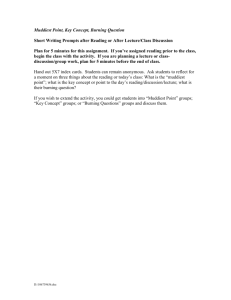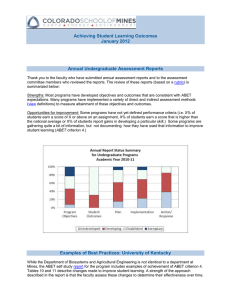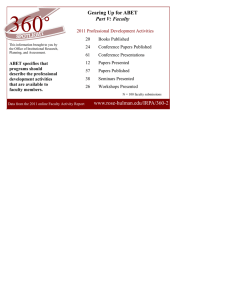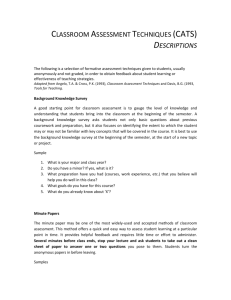Achieving Student Learning Outcomes October 2011 Exploring Software Options
advertisement
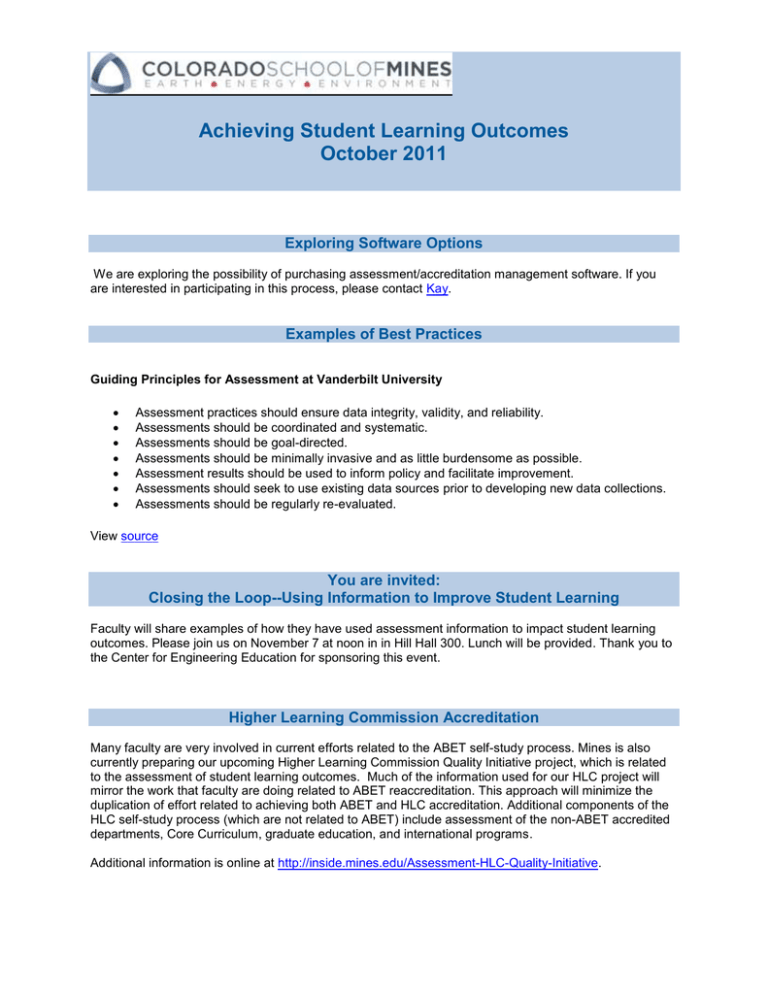
Achieving Student Learning Outcomes October 2011 Exploring Software Options We are exploring the possibility of purchasing assessment/accreditation management software. If you are interested in participating in this process, please contact Kay. Examples of Best Practices Guiding Principles for Assessment at Vanderbilt University Assessment practices should ensure data integrity, validity, and reliability. Assessments should be coordinated and systematic. Assessments should be goal-directed. Assessments should be minimally invasive and as little burdensome as possible. Assessment results should be used to inform policy and facilitate improvement. Assessments should seek to use existing data sources prior to developing new data collections. Assessments should be regularly re-evaluated. View source You are invited: Closing the Loop--Using Information to Improve Student Learning Faculty will share examples of how they have used assessment information to impact student learning outcomes. Please join us on November 7 at noon in in Hill Hall 300. Lunch will be provided. Thank you to the Center for Engineering Education for sponsoring this event. Higher Learning Commission Accreditation Many faculty are very involved in current efforts related to the ABET self-study process. Mines is also currently preparing our upcoming Higher Learning Commission Quality Initiative project, which is related to the assessment of student learning outcomes. Much of the information used for our HLC project will mirror the work that faculty are doing related to ABET reaccreditation. This approach will minimize the duplication of effort related to achieving both ABET and HLC accreditation. Additional components of the HLC self-study process (which are not related to ABET) include assessment of the non-ABET accredited departments, Core Curriculum, graduate education, and international programs. Additional information is online at http://inside.mines.edu/Assessment-HLC-Quality-Initiative. Classroom Assessment Technique (CAT): The Muddiest Point The Muddiest Point consists of asking students to jot down a quick response to one question: "What was the muddiest point/most confusing topic?" The focus of the Muddiest Point assessment might be a lecture, a discussion, a homework assignment, a lab experiment, etc. To implement this CAT: 1. Determine what you want feedback on: the entire class session or one self-contained segment? A lecture, a discussion, a presentation? 2. Reserve a few minutes at the end of the class session to ask the question, to allow students to respond, and to collect their responses. Or, ask students to email you (or post to Blackboard) the topic they are most confused about, prior to the beginning of class. 3. Respond to the Muddiest Points or have students work in small groups to discuss possible solutions/responses to the concept that they indicated were the most confusing to them. View source Thank you to the Assessment Committee Below is a list of assessment committee members for 2011-12. Tom Boyd, Dean of Graduate Studies Joe Crocker, Engineering Tricia Douthit-Paulson, Institutional Research Tracy Gardner, Chemical and Biological Engineering and Faculty Senate representative Ron Miller Director, Center for Engineering Education Jennifer Miskimins, Petroleum Engineering Carl Mitcham, Liberal Arts and International Studies Barb Moskal, Trefny Institute Representative Kay Schneider, Director of Assessment Candy Sulzbach, Engineering Chet Van Tyne, Metallurgical and Materials Engineering David Wood, Engineering Physics Quote of the month “An effective assessment program should spend more time and money on using data than on gathering it…providing support for making changes in response to the evidence.” Source: Banta T., Blaich, C. (2011, January/February). Closing the assessment loop. Change: The Magazine of Higher Learning , 22- 27. Source: http://www.insidehighered.com/ blogs/university _of_venus/assessment_ as_an_act_of_care This newsletter is published by the assessment office: Kay Schneider, Director 303-273-3087 kmschnei@mines.edu http://inside.mines.edu/assessment
